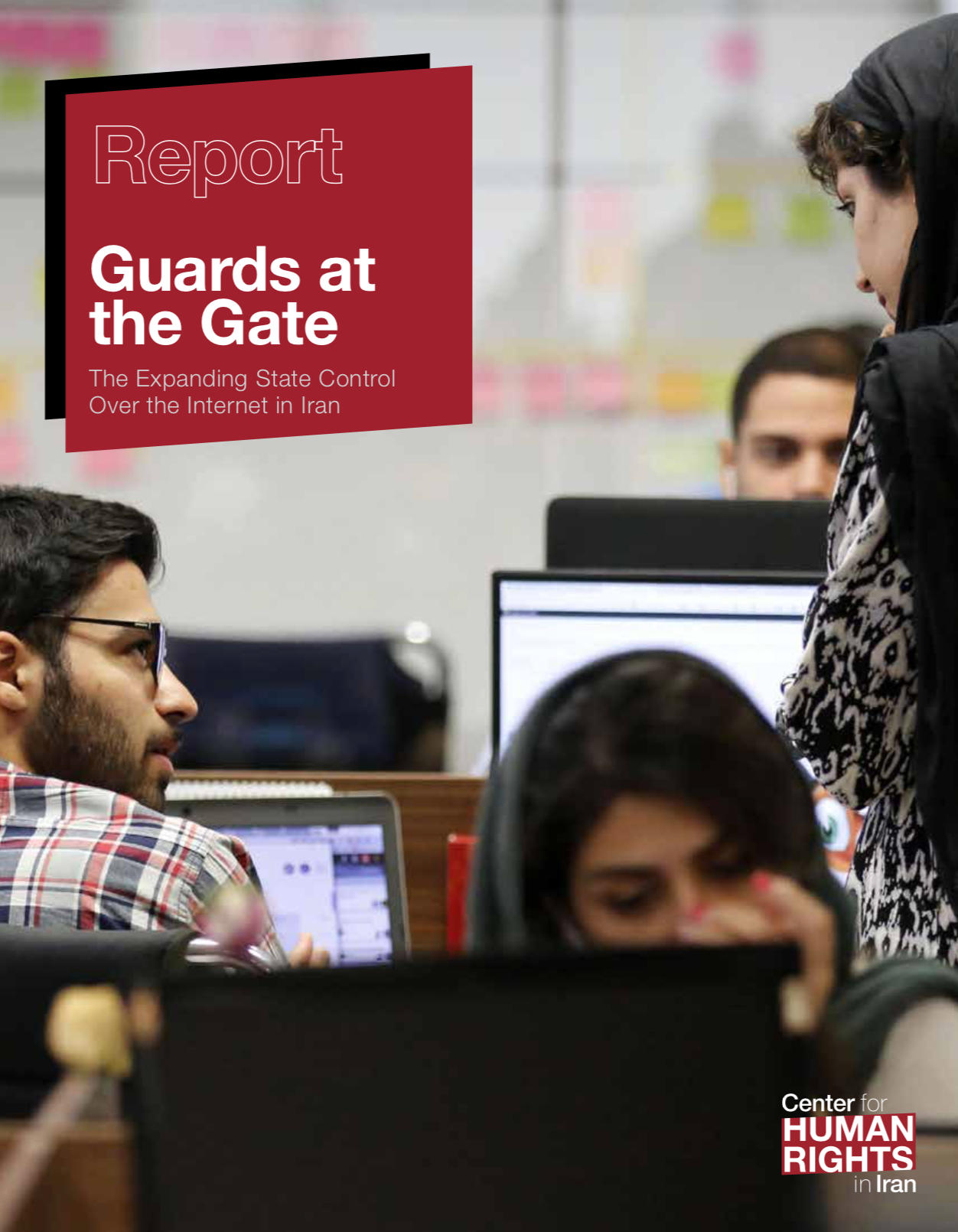Executive Summary
 Guards at the Gate: The Expanding State Control Over the Internet in Iran by the Center for Human Rights in Iran (CHRI), examines the key policy and technological developments regarding the internet in Iran over the 2013-2018 period. The report reveals the steady progress the Iranian government has made in controlling its citizenry’s use of the internet. During the unrest that swept through Iran on the eve of 2018, the authorities implemented major disruptions to internet access through slowdowns and the blocking of circumvention tools, blocked the Instagram social media platform and the Telegram messaging app heavily used by the protesters to mobilize the street protests, and briefly cut off Iranians’ access to the global internet on December 30, 2017, demonstrating a new level of technical sophistication. These actions confirm the main contention of this report—namely, that while internet use has expanded throughout Iran with the help of upgrades to the country’s telecommunications infrastructure and faster and cheaper internet service, key technological initiatives undertaken by the Iranian government, in particular development of Iran’s state- controlled National Internet Network (NIN), have significantly enhanced the government’s ability to restrict, block and monitor internet use in Iran.
Guards at the Gate: The Expanding State Control Over the Internet in Iran by the Center for Human Rights in Iran (CHRI), examines the key policy and technological developments regarding the internet in Iran over the 2013-2018 period. The report reveals the steady progress the Iranian government has made in controlling its citizenry’s use of the internet. During the unrest that swept through Iran on the eve of 2018, the authorities implemented major disruptions to internet access through slowdowns and the blocking of circumvention tools, blocked the Instagram social media platform and the Telegram messaging app heavily used by the protesters to mobilize the street protests, and briefly cut off Iranians’ access to the global internet on December 30, 2017, demonstrating a new level of technical sophistication. These actions confirm the main contention of this report—namely, that while internet use has expanded throughout Iran with the help of upgrades to the country’s telecommunications infrastructure and faster and cheaper internet service, key technological initiatives undertaken by the Iranian government, in particular development of Iran’s state- controlled National Internet Network (NIN), have significantly enhanced the government’s ability to restrict, block and monitor internet use in Iran.
Over the period this report covers, which encompasses President Rouhani’s first term (2013-2017) and the beginning of his second, internet use has grown robustly in Iran. According to the UN’s International Telecommunication Union (ITU), 53 percent of the country’s 80 million-plus population use the internet, which may well be an under-estimate. With 3G and 4G service made widely available by the Rouhani administration, tens of millions of Iranians now access the internet and social media on the 40 million mobile phones now in use in the country. Messaging applications such as Telegram serve as a major platform for societal discussion of political, social and cultural issues. Online communication has become particularly central to Iran’s young, educated and tech savvy population, with the internet increasingly eclipsing traditional print and broadcast media to become the most significant “public square” in Iran.
Yet while internet use has increased and its centrality to Iranian discourse has grown exponentially—and the Rouhani administration has facilitated this greater use by increasing internet speeds and lowering access costs in Iran—internet control, censorship and surveillance by the state have also expanded significantly. This is largely due to the development of the NIN, which has accelerated under the Rouhani administration. The NIN’s national search engines now systematically filter key words and phrases—and send users to sites that deliver only state-approved and sometimes fabricated content. NIN tools and services facilitate the state’s ability to identify users and access their online communications, deeply compromising user privacy and security. The government steers Iranians toward use of the NIN and its search engines, security certificates, email services and video broadcasting services through price and internet speed incentives, violating net neutrality principles. Critically, the NIN’s ability to separate domestic internet traffic in Iran from international internet traffic now allows, for the first time, the state to cut Iranians off from the global internet while maintaining access to domestic online sites and services.
The capacity to restrict the people of Iran to state-approved content on a domestic internet has been a long-standing goal of hardliners in Iran—intelligence and security agencies, judicial officials, and the country’s supreme leader, Ali Khamenei, who fear internet freedom and view the internet as a Western ploy to undermine the Islamic Republic. With the demonstrated capacity to sever Iranians’ access to the global internet while maintaining the availability of Iran’s state-controlled internet, this goal has now been realized, justifying for them the huge investment the Iranian government has made in the development of the NIN.
In addition, during this period the government’s blocking of major social media sites such as Twitter, Facebook and YouTube, as well as millions of other websites, has continued, even as Rouhani has on a few occasions thwarted the blocking of messaging applications such as WhatsApp. Moreover, intensifying state filtering is now increasingly targeting applications that provide encryption by default (which provide security automatically, without user input), that are vital to Iranians’ efforts to maintain online privacy. State-sponsored hacking attacks—DDoS attacks, phishing, malware, message interception and the use of insecure fake applications—have also multiplied. With hardline state security and intelligence organizations in control of the country’s telecommunications infrastructure, their ability to access private online communications, unhindered by any judicial oversight, poses grave threats to Iranian users; individuals are arrested and sentenced to lengthy prison terms on the basis of online content unlawfully obtained by the state in this manner.
Rouhani has been silent in the face of these attacks, despite his stated support for internet freedom and his promulgation of a citizens’ rights charter. Indeed, Rouhani has proved either unable or unwilling to defend internet freedom, and, in some respects, such as in the accelerated development of the NIN, has significantly facilitated and implemented decisions and initiatives that severely violate it. The recent brief severance of access to the global internet and the blocking of Telegram and Instagram are a huge departure from his statements after his re-election in 2017 against filtering and his pledges to protect Iranians’ online connection to the world.
The state has significantly deepened its control over cyberspace in Iran. As the NIN has progressed toward the final stages of implementation, it has become clear that the government’s development of a national network that provides faster and cheaper internet access has also led to the creation of a technical infrastructure that can more effectively block, censor, spread false information, and access Iranian users’ online communications, and it has made the Iranian citizenry highly vulnerable to the state intelligence organizations that control this technical infrastructure. Internet freedom is under assault in Iran, and the rights of the Iranian people to information access and internet privacy, both integral to the fundamental right of freedom of expression, are being severely violated.

